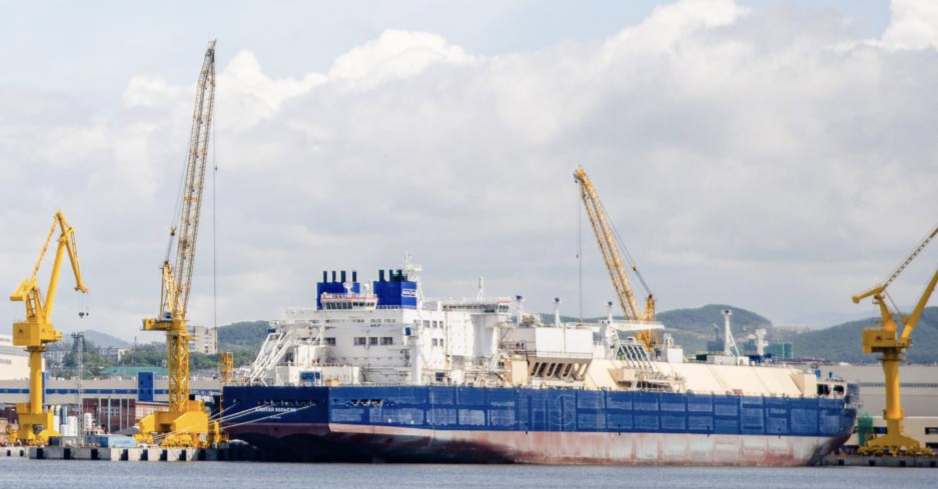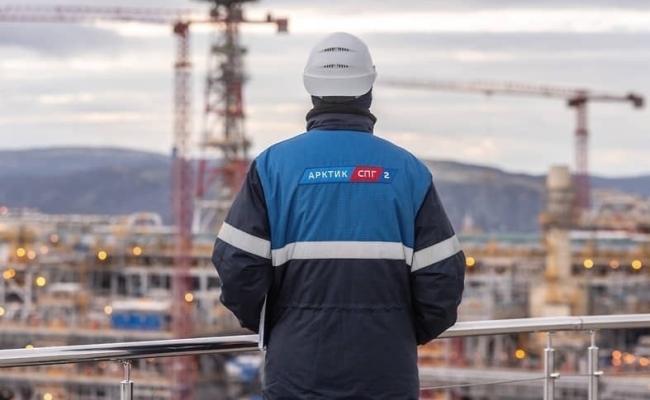Arctic LNG 2 Facing Vessel Shortage as Zvezda Shipyard Delays Delivery, Japanese MOL Exits Charter Contract

Arc7 LNG carrier Alexey Kosygin at the Zvezda shipyard. (Source: Zvezda)
Sanctions continue to impact Russia’s Arctic LNG 2 project. Japanese operator Mitsui O.S.K. Lines is looking to step away from the project and ice-capable LNG tankers under construction at Russia’s own Zvezda shipyard have been delayed again.
Sanctions-related set-backs continue to mount for Russia’s flagship Arctic LNG 2 project. Earlier this month it halted production due to the inability to find buyers for its sanctioned liquefied natural gas (LNG).
Now the delivery of much-needed ice-capable LNG carriers from Russia’s Zvezda shipyard has also been delayed. Originally two vessels were supposed to become available by the end of the year and in early 2025. Both deliveries have been pushed back into the first half of 2025.
In addition, Japanese shipping company Mitsui O.S.K. Lines (MOL) announced that it will not be able to provide charter services as intended to the Arctic LNG 2 project.
The company warned that it “in light of the strengthening of sanctions from the U.S. and Europe, we need to modify the contract schemes of the charter contract of the three LNG carriers.”
Key partner
MOL had placed orders for three highly ice-capable Arc7 LNG carriers with South Korean shipyard Hanwha. Two of the vessels have been launched and completed some sea and gas trials.A third remains under construction.
MOL has functioned as one of Novatek’s key partners for several years
Following U.S. sanctions earlier this year the vessels remain in limbo at the shipyard and can not be used as originally intended for service with Arctic LNG 2.
MOL has functioned as one of Novatek’s key partners for several years providing shipping services for the company’s predecessor project, Yamal LNG.
The fact that the company is looking to step away from its charter contract and sell the three vessels, likely at a substantial loss since there is limited demand for ice-capable LNG carriers elsewhere in the world, suggests that the complex sanctions environment is becoming increasingly challenging to navigate for companies previously doing business with Russia.
Domestic construction faces delays
Russia’s efforts to construct vessels domestically to circumvent Western sanctions also continue to hit roadblocks.
Several key technologies, including the membrane used to create the tank holding the superchilled gas, as well as azimuthing propulsion units, can no longer be provided to Russia leaving orders from the Zvezda shipyard in limbo as it searches for alternative suppliers.
Zvezda received five pre-constructed hulls from South Korean shipyard Samsung. All five have been floated and continue being worked on at the yard near Vladivostok. However, only two were reported to be close to commissioning, with the remaining ones lacking key components.
Despite Novatek dispatching hundreds of workers to the Far East to support Zvezda efforts, completion of the first two vessels has now slipped into 2025.
While Arctic LNG 2 can export LNG with conventional or light ice-class vessels during summer and fall, it will require at least a handful of Arc7 carriers if it intends to operate year-round.



